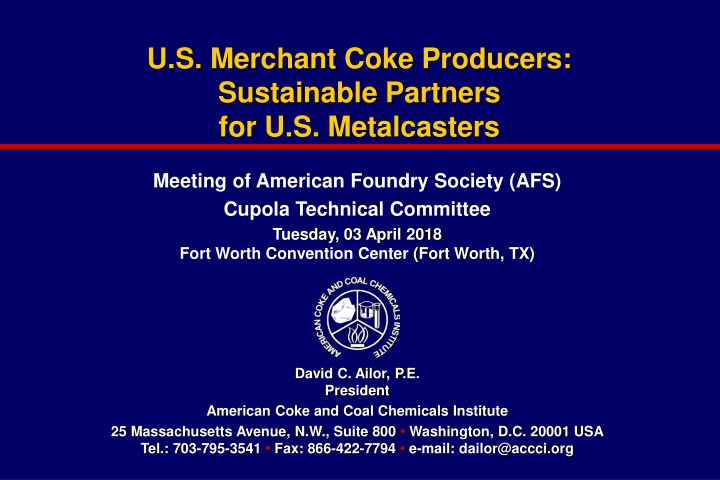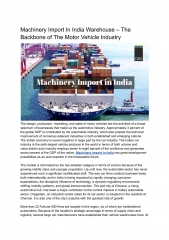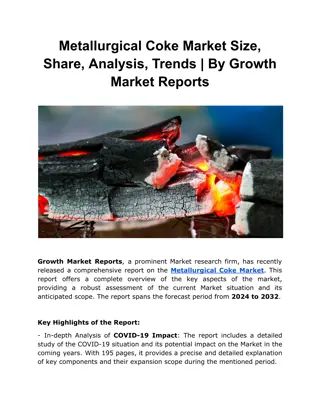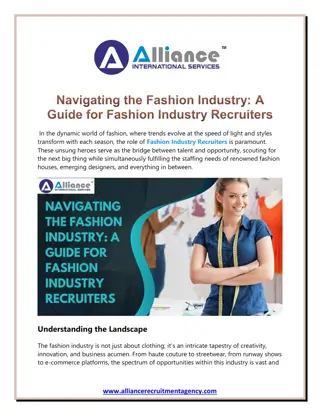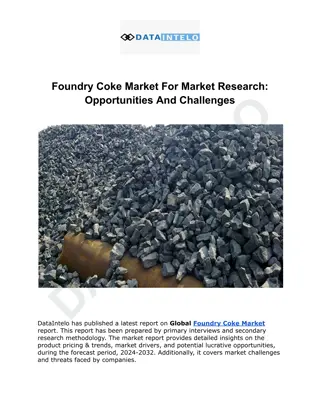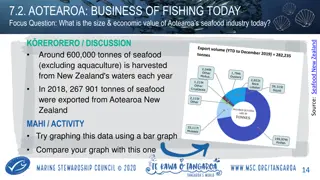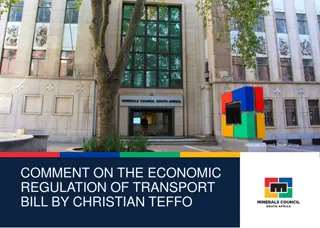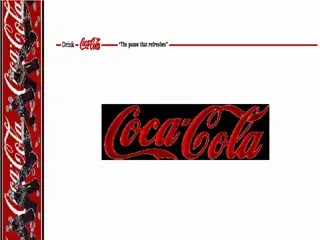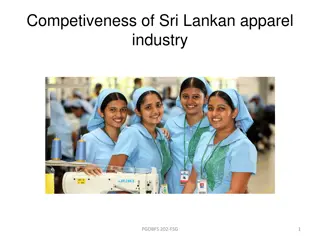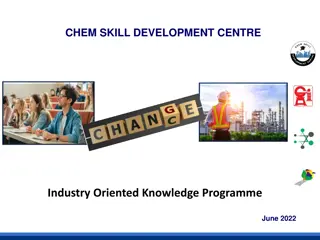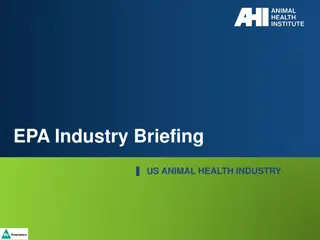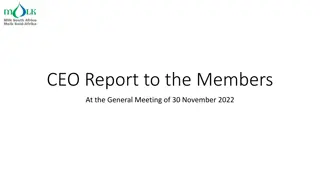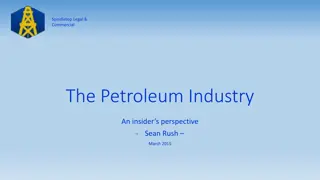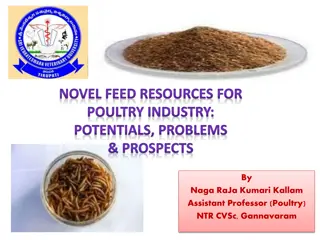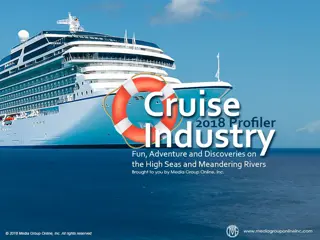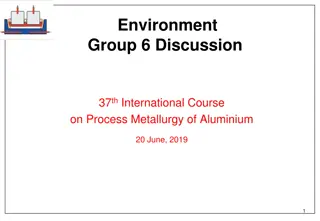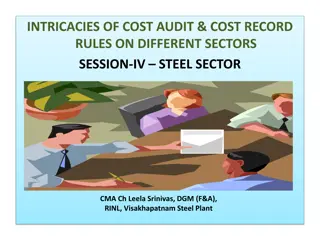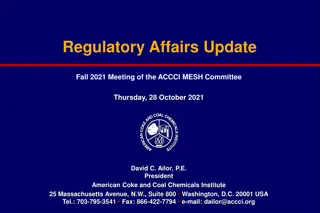U.S. Coke Industry Overview
The American Coke and Coal Chemicals Institute (ACCCI) plays a vital role in representing the interests of the metallurgical coke and coal chemicals industry in the U.S. and Canada. With a focus on sustainable partnerships with metalcasters, ACCCI's merchant members contribute significantly to total coke production. Get insights into the U.S. coke industry landscape, including operating coke plants and integrated steel by-product recovery facilities. Explore the steps taken by ACCCI's merchant members to ensure sustainable practices and continued collaboration with metalcasters.
Download Presentation

Please find below an Image/Link to download the presentation.
The content on the website is provided AS IS for your information and personal use only. It may not be sold, licensed, or shared on other websites without obtaining consent from the author.If you encounter any issues during the download, it is possible that the publisher has removed the file from their server.
You are allowed to download the files provided on this website for personal or commercial use, subject to the condition that they are used lawfully. All files are the property of their respective owners.
The content on the website is provided AS IS for your information and personal use only. It may not be sold, licensed, or shared on other websites without obtaining consent from the author.
E N D
Presentation Transcript
U.S. Merchant Coke Producers: Sustainable Partners for U.S. Metalcasters Meeting of American Foundry Society (AFS) Cupola Technical Committee Tuesday, 03 April 2018 Fort Worth Convention Center (Fort Worth, TX) David C. Ailor, P.E. President American Coke and Coal Chemicals Institute 25 Massachusetts Avenue, N.W., Suite 800 Washington, D.C. 20001 USA Tel.: 703-795-3541 Fax: 866-422-7794 e-mail: dailor@accci.org
AMERICAN COKE AND COAL CHEMICALS INSTITUTE (ACCCI) ACCCI was formed in 1944 by companies interested in establishing a forum to discuss and act upon issues of common concern to the metallurgical coke and coal chemicals industry. Today, ACCCI members represent over 95% of the metallurgical coke produced in the U.S. and Canada, including both merchant coke producers and integrated steel companies with coke production capacity, and 100% of companies producing coal chemicals in the U.S. and Canada. ACCCI s function is to advance the interests of the metallurgical coke and coal chemicals industry by communicating industry positions to members of Congress and Federal regulatory officials; cooperating with governmental agencies having jurisdiction over the industry; providing a forum for the exchange of information and discussion of issues; collecting statistics related to the industry; and, promoting the use of coke and its byproducts in the marketplace. 2
ACCCI MEMBERSHIP Merchant Producers of Metallurgical Coke All produce furnace/foundry coke for sale on the open market Steel Manufacturers that Produce Coke All produce furnace coke for use internally in their production of steel One reportedly produces foundry coke Coke Sales Agents Producers/processors of chemicals derived from distillation of coal and coal tar 3
PRESENTATION OVERVIEW Overview of the U.S. Coke Industry ACCCI s Four Merchant Members Producing Foundry Coke Steps Taken by ACCCI s Four Merchant Members Producing Foundry Coke to Continue Being Sustainable Partners for U.S. Metalcasters Summary/Conclusions 4
OVERVIEW OF THE U.S. COKE INDUSTRY 16 operating coke plants (50 batteries) 6 integrated steel by-product recovery plants (20 batteries) 5 merchant by-product recovery plants (10 batteries) 5 merchant heat-recovery plants (20 batteries) ACCCI s six merchant members account for approximately 47% of total U.S. metallurgical (furnace/foundry) coke production (5.5 MM tons of 11.8 MM tons during 2016). Four of ACCCI s six merchant members produce foundry coke. 5
ACCCI FOUR MERCHANT MEMBERS PRODUCING FOUNDRY COKE ACCCI s four merchant members producing foundry coke do so at 4 operating coke plants (9 batteries): ABC Coke (Tarrant, AL) (3 batteries) Erie Coke Corp. (Erie, PA) (2 batteries) ERP Compliant Coke, LLC (Birmingham, AL) (3 batteries) Tonawanda Coke Corp. (Tonawanda, NY) (1 battery) The plants account for approximately 5-10% of total U.S. metallurgical (furnace/foundry) coke production (>1 MM tons of 11.8 MM tons during 2016) They have a total production capacity of 1.781 MM tons/year. All have been sustainable partners to U.S. metalcasters for decades under economic conditions both weak and strong and administrations with policies both more and less favorable to business and have prepared to continue being so. 6
U.S. Merchant Producers of Foundry Coke TonawandaCoke Buffalo, NY Erie Coke () Erie, PA ABC COKE Tarrant, AL ns ERP Compliant Coke. N. Birmingham, AL AFS Foundry Executive Management Conference Hyatt Regency Lake Tahoe Resort Incline Village, NV September 21-23, 2008
ACCCIs Four Merchant Members Producing Foundry Coke AFS Foundry Executive Management Conference Hyatt Regency Lake Tahoe Resort Incline Village, NV September 21-23, 2008
ABC COKE ABC Coke is the largest merchant producer of foundry coke in the United States. Three batteries built in 1942, 1952 and 1968 9
ERIE COKE CORP. Erie Coke is an ISO 9001 Registered merchant producer of high- performance foundry coke. Two batteries built in 1943 and 1951 10
ERP COMPLIANT COKE, LLC ERP Compliant Coke, LLC is one of the oldest industrial companies in Birmingham, Alabama. Three batteries built in 1952 (rebuilt in 1979), 1954 (rebuilt in 1981) and 1958 11
TONAWANDA COKE CORP. Tonawanda Coke Corp. is an ISO 9001 Registered merchant producer of high-performance foundry coke. One battery built in 1961 12
PRODUCTION CAPACITIES (TONS) OF ACCCI S FOUR MERCHANT MEMBERS PRODUCING FOUNDRY COKE ABC Coke Tarrant, AL 700,000 ERP Compliant Coke Birmingham, AL 597,000 Erie Coke Erie, PA 215,000 Tonawanda Coke Tonawanda, NY 269,000 Total 1,781,000 Source: 2016 EPA Spreadsheet of Coke Plant Ownership and Locations
STEPS TAKEN BY ACCCIS FOUR MERCHANT MEMBERS PRODUCING FOUNDRY COKE TO CONTINUE BEING SUSTAINABLE PARTNERS FOR U.S. METALCASTERS Tailoring operations to meet the coke requirements/needs of metalcasters Organizing to engage regulatory agencies as the need arises 14
TAILORING OPERATIONS TO MEET THE COKE REQUIREMENTS/NEEDS OF METALCASTERS Steps that ACCCI s four merchant members producing foundry coke have taken to tailor their operations to meet the requirements/needs of metalcasters include: Tailoring product lines and production tto meet customer needs/demand (typical merchant plant services over 100 customers) Using many different coal blends (e.g., for foundry coke production) Tailoring transportation/delivery infrastructure to meet customers needs Maintaining batteries to ensure long-term, reliable battery operation/performance/environmental compliance 15
ORGANIZING TO ENGAGE REGULATORY AGENCIES AS THE NEED ARISES Steps that ACCCI s four merchant members producing foundry coke have taken to organize in preparation for engaging the principal federal regulatory agency targeting the industry the U.S. Environmental Protection Agency (EPA) include their active involvement in two coke industry organizations/advocacy groups: ACCCI, which focuses primarily on EPA general industry rulemakings/issues Coke Oven Environmental Task Force (COETF), which focuses primarily on EPA rulemakings/issues specific to the coke industry (i.e., sector-specific rulemakings) 16
GENERAL INDUSTRY EPA RULEMAKINGS/ISSUES BEING ADDRESSED VIA ACCCI Rulemakings/issues of immediate concern: EPA s Greenhouse Gas Policies EPA s SSM Policies EPA s Residual Risk Policies EPA s Ozone NAAQS Final Rule EPA s Review/Reconsideration of the PM NAAQS EPA s New Source Review (NSR) Reform Initiative EPA/U.S. Army Corps Of Engineers Waters of the U.S. (WOTUS) Final Rule EPA s Implementation of TSCA Reform Legislation Enacted in June 2016 PEER Petition Regarding EPA s RCRA Corrosivity Characteristic ACCCI has engaged EPA on such rulemakings/issues for decades, primarily via its involvement in ad hoc multi-association coalitions/advocacy groups whose sole focus is these rulemakings/issues. 17
BACKGROUND ON THE COKE OVEN ENVIRONMENTAL TASK FORCE (COETF) The COETF was formed by the American Iron and Steel Institute (AISI) and ACCCI in 1996 to address major environmental issues facing the U.S. by-product coke industry collaboratively. The COETF operates as a semiautonomous, self-funded entity. ACCCI manages the COETF. The COETF represents all 11 U.S. by-product recovery plants (30 by-product recovery batteries). 6 integrated steel by-product recovery plants (20 batteries) 5 merchant by-product recovery plants (10 batteries) 18 continued
BACKGROUND ON THE COKE OVEN ENVIRONMENTAL TASK FORCE (COETF) (Concluded) Since its formation in 1996, the COETF has successfully engaged EPA on a number of EPA rulemakings: EPA s Final Pushing/Quenching/Battery Stack (PQBS) MACT Standards (68 Fed. Reg. 18008 (April 14, 2003)) EPA s Final Miscellaneous Organic NESHAP (MON) (68 Fed. Reg. 63852 (November 10, 2003)) and Organic Liquids Distribution (OLD) NESHAP (69 Fed. Reg. 5038 (February 3, 2004)) EPA s Final Residual Risk Standard for MACT Track Coke Oven Batteries (69 Fed. Reg. 48337 (April 15, 2005)) (First residual risk standard promulgated by EPA under Title III of the Clean Air Act Amendments of 1990) EPA s Final New Source Performance Standards (NSPS) Subpart Db and Its Applicability to Coke Oven Gas (COG) (71 Fed. Reg. 9866 (February 27, 2006)) EPA's Final Effluent Limitations Guidelines (ELGs) Rule for the Iron/Steel Source Category (67 Fed. Reg. 64216 (October 17, 2002)) The COETF stands ready to engage EPA as the Agency moves forward with new sector-specific rulemakings/issues of concern to the coke industry. 19
PRINCIPAL SECTOR-SPECIFIC EPA RULEMAKING OF IMMEDIATE CONCERN TO THE U.S. COKE INDUSTRY EPA s Risk and Technology Review (RTR) of 2003 MACT Standards for Coke Pushing, Quenching and Battery Stacks (PQBS) 20
EPAS RISK AND TECHNOLOGY REVIEW (RTR) OF 2003 MACT STANDARDS FOR COKE PQBS On April 14, 2003, EPA promulgated maximum achievable control technology (MACT) standards for coke pushing, quenching and battery stacks (PQBS). Standards are to limit hazardous air pollutants (HAPs) from PQBS (e.g.,benzene, toluene, coke oven emissions ). Clean Air Act (CAA) requires EPA to determine within eight years of promulgation (i.e., by 2011 for PQBS) whether tighter standards should be issued, based on: risks to public health associated with MACT-level emissions (risk review); and, whether any improvements in control technology have occurred since the MACT standards were issued (technology review). EPA is behind schedule on the RTR for coke PQBS, having kicked off the multi-year (three-to- four year) RTR in early 2015. The rulemaking is NOT subject to a court-ordered deadline. 21
COETF ISSUES ON THE PQBS RTR Scope of EPA s Information Collection Request (ICR) Unit risk estimate for Coke Oven Emissions Underlying exposure assumptions for EPA s risk estimates Dispersion modeling Emission factors Cost to comply 22
INITIAL EPA EFFORTS ON THE PQBS RTR EPA provided the COETF with a draft Information Collection Request (ICR) during August 2015 for comment. Enclosure 1: Questionnaire, which asks questions about the company and all of the operations at its coke plant(s) Enclosure 2: Testing request, which includes all of the details of where and how to test From August 2015 through March 2016, the COETF engaged EPA on the draft ICR. 23
COETF EFFORTS ON EPAS FINAL (APRIL 2016) ICR EPA released the final ICR in April 2016. After that, the COETF served as a roundtable for discussing how individual companies planned to respond the various questions EPA posed. In June 2016, the COETF formed a Modeling Subgroup to review/consider and make recommendations to the COETF on what to advocate to EPA in terms of RTR modeling, and when. 24
SUMMARY/CONCLUSIONS ACCCI s four merchant members producing foundry coke have been sustainable partners to U.S. metalcasters for decades under economic conditions both weak and strong and administrations with policies both more and less favorable to business and have prepared to continue being so: Tailoring operations to continue meeting the coke requirements/needs of metalcasters Organizing to engage regulatory agencies as the need arises 25
QUESTIONS? 26
